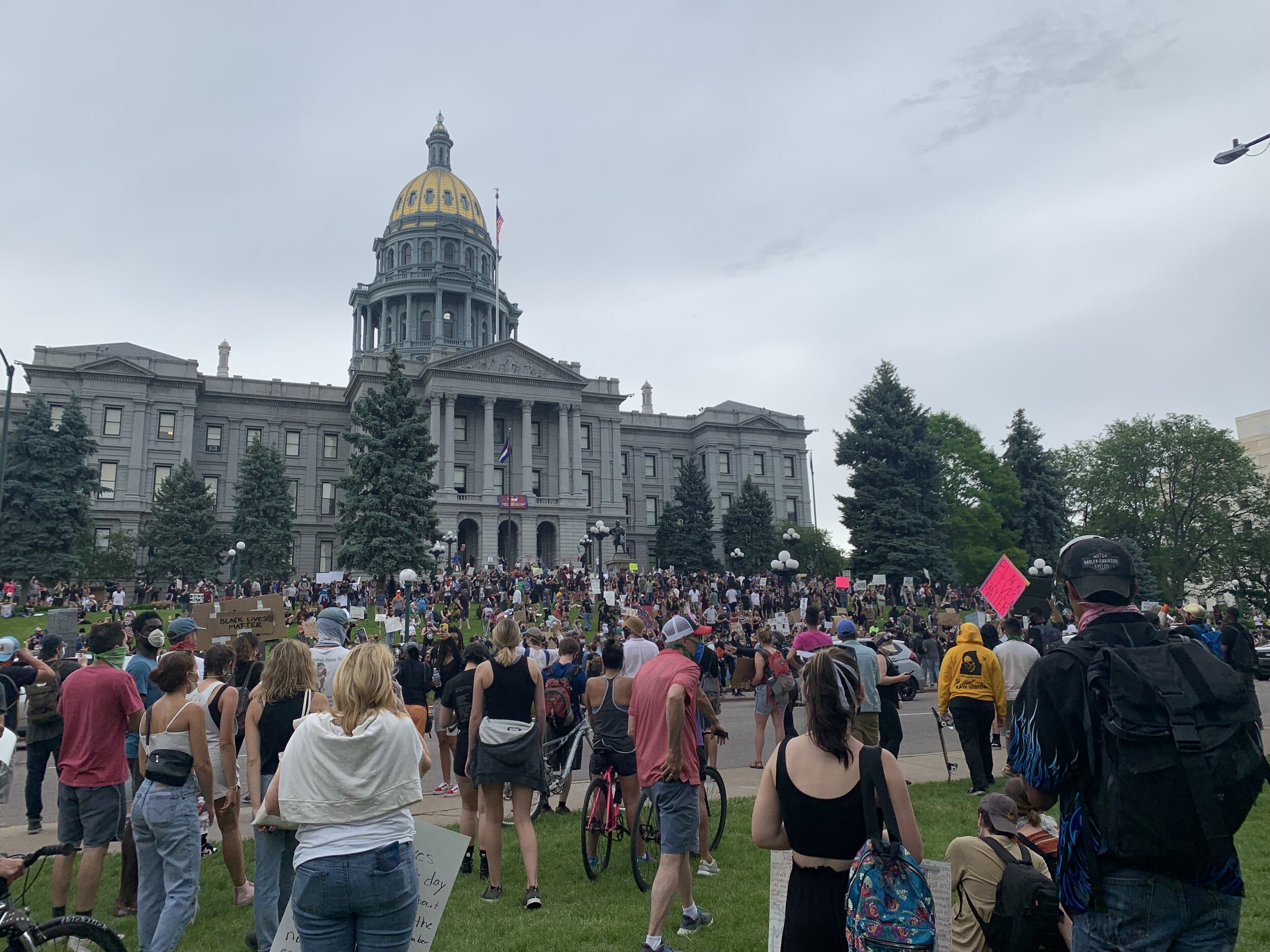Inside the Black Lives Matter Movement: My Experience at Three Denver Protests
This is a civil rights movement like our generation has never seen. George Floyd’s killing sparked worldwide protests against police brutality. Millions of people are standing in solidarity with the movement, and I am one of them.
I have attended three different protests in Denver, Colorado. Each day brought profound understanding and revealed why Black Lives Matter has become the most important movement in recent memory.
Tensions were high during the first weekend of the protest. Thousands of people gathered near the capitol building to march together. Organizers of the protest and other members of the Black community shared their stories and their pain, and then we marched through downtown. Chants of “Black Lives Matter,” “Hands up, don’t shoot,” and the names of George Floyd and Breonna Taylor echoed through the city. The protestors were passionate and furious –– yet peaceful.
Protesters gather outside the capitol in Denver. Source: Lauryn Starke.
After the march, we gathered again by Civic Center Park where we were met with a massive police force, including the Denver Police Department and SWAT with guns aimed at the ready. Protestors stood and kneeled in front of officers with their hands in the air, making their voices heard. As we chanted “I can’t breathe,” tear gas canisters were flung into the crowd. Everyone screamed and scattered as the police began advancing on protestors and pushing into the park.
I sat in complete disbelief at the scene that played out before me. I had never in my life been so terrified of the police, that I ran from them in fear. I had always seen the police as a sign of safety, not a threat of danger. At that moment, I realized that was the whole point. I experienced just a sliver of the fear the Black community faces every single day when confronted by police. I know I can never even imagine what that’s truly like, but even a moment of that fear sent me running for my life.
Despite the violent response to first protest I attended, I was more fired up than ever to go back and keep fighting. Before, I supported the movement, but now I understood what we were really fighting against. It isn’t about one death, or even a few –– it’s about the systematic oppression that forces Black Americans to live in fear just because of the color of their skin.
The next two days were completely different. Much of my time was spent listening to Black people speak out about their experiences with racism and with the police, and call out the oppressive systems put in place that perpetuate violence and prejudice.
Black Lives Matter chalk art on the streets of Denver. Source: Lauryn Starke
A mother stood on stage and spoke about how she feared that her children may come home one day without a father or not come home at all. A college student urged people to evaluate their privilege and to hold on tight because this movement is not going to be easy. A 16-year old girl poured her heart into a poem about how she feels like she’s never had a place in the world because of the color of her skin. A little boy told the crowd that he was there because he couldn’t stand up for a little girl who was bullied for being Black, but he was ready to stand up now.
“All I want is for everyone to be equal,” he said.
These protests and this movement have never just been about George Floyd. It’s about the stories of every single member of the Black community who have lost their lives to police brutality and suffered at the hands of systematic oppression designed to disadvantage them. It’s about Black people being 2.5 times more likely to be killed by police than white people. It’s about the fact that police kill unarmed Black people at five times the rate of unarmed white people and that 99% of killings by police result in no officers being charged with a crime. It’s for Breonna Taylor, Michael Brown, Tamir Rice and all the other victims of police violence whose killers have faced no charges.
“This is not a moment –– it’s a movement.”
As a country, we cannot turn away from these issues any longer. They’re brutal and ugly and they should make you feel uncomfortable. The only way to move forward is to work to dismantle our prejudices and the racist systems that still stand in America today.
This is not a moment –– it’s a movement, and one that isn’t stopping until we realize that all lives can't matter until Black lives do.

